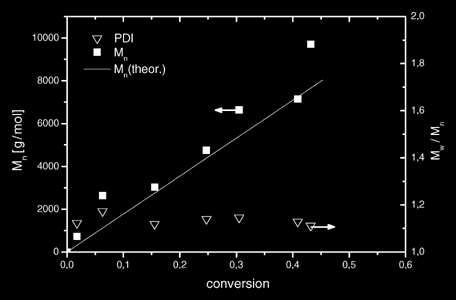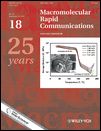RAFT Polymerization of Pentafluorophenyl Methacrylate: Preparation of Reactive Linear Diblock Copolymers†
Supporting information for this article is available at the bottom of the article's abstract page, which can be accessed from the journal's homepage at http://www.mrc-journal.de, or from the author.
Abstract
Summary: Reversible addition fragmentation chain transfer (RAFT) polymerization of pentafluorophenyl methacrylate (PFMA) was carried out in the presence of cumyldithiobenzoate and 4-cyano-4-((thiobenzoyl)sulfanyl)pentanoic acid, respectively. These chain transfer agents with 2,2′-azoisobutyronitrile (AIBN) as initiator yielded the active ester polymer poly(PFMA) with  up to 17 000 g · mol−1 and low polydispersity index (
up to 17 000 g · mol−1 and low polydispersity index ( < 1.2). Kinetic analysis using 19F NMR spectroscopy and gel permeation chromatography (GPC) measurements showed controlled polymerization behavior for both chain transfer agents. Successful preparation of linear diblock copolymers consisting of an active ester block and methyl methacrylate, N-acryloylmorpholine, or N,N-diethylacrylamide, respectively, could be demonstrated. These polymers could easily react with amines in a polymer analogous reaction to form multifunctional polymers.
< 1.2). Kinetic analysis using 19F NMR spectroscopy and gel permeation chromatography (GPC) measurements showed controlled polymerization behavior for both chain transfer agents. Successful preparation of linear diblock copolymers consisting of an active ester block and methyl methacrylate, N-acryloylmorpholine, or N,N-diethylacrylamide, respectively, could be demonstrated. These polymers could easily react with amines in a polymer analogous reaction to form multifunctional polymers.





